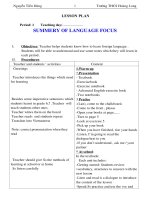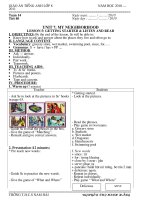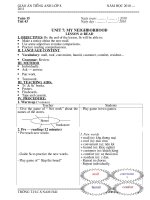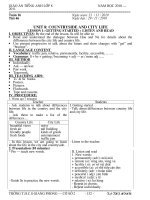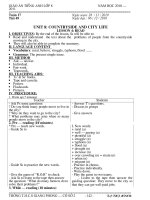- Trang chủ >>
- Sư phạm >>
- Sư phạm văn
GIAO AN TIENG ANH 8 TUAN 6 PPCT MOI NHAT THAI BINH
Bạn đang xem bản rút gọn của tài liệu. Xem và tải ngay bản đầy đủ của tài liệu tại đây (434.42 KB, 7 trang )
<span class='text_page_counter'>(1)</span><div class='page_container' data-page=1>
<b>Tuần 6</b>
<b>Tiết 16</b> <i>Ngày soạn: 09 / 09 / 2010Ngày dạy : 20 / 09 / 2010 </i>
<b>Unit 3</b>
:
<b>At home</b>
<b>Lesson 5 Write</b>–
<b>I. Objectives:</b>
By the end of the lesson, Ss will be able to apply the writing skill to describe the
kitchen, the living room, the bed room.
<b>II. Language content </b>
<b>Vocabulary</b>: folder, wardrobe, towel rack, beneath…..
<b>Grammar</b>: The simple present.
<b>III. Method </b>
Communicative approach
Ask - answer.
Individually.
<b>IV. Teaching aids: </b>
Ts’ & Ss’ books.
Pictures
Posters.
<b>IV. Procedure:</b>
<b>1. Warm up (</b>5 minutes)
Teacher Students
- Has Ss play game “Network” to review of
some prepositions of place.
- Divides class into two teams of five and
guides Ss how to play game
- Gives feedback
-Listen to the teacher.
- Play game in two teams.
<b>2. Pre </b>–<b> writing ( 7 minutes)</b>
* Pre-teach vocabulary:
- Explain new words. <i>I. New words.</i>+ folder (real object): kÑp giÊy
+ beneath: ë phÝa díi
+ towel rack : ( picture ) giá treo khăn.
+ dish rack : (picture): giá đựng bát đĩa
+ lighting fixture (picture): đèn chùm.
- Guide Ss to read in chorus.
- Call some Ss to read again on front of the
class.
- Checking by rub out and remember.
- Ask Ss to look at the picture read the
description of Hoa’s room.
- Listen to the T’s pronunciation.
- Repeat in chorus.
- Repeat individually.
- Play game “ Rub out and remember”.
<i>II. Read.</i>
- Look at the picture and read the passage in
exercise 1.
Prep. Of
place
on at
in
beside
in front of
behind
opposite
on the other side
</div>
<span class='text_page_counter'>(2)</span><div class='page_container' data-page=2>
- Ask some comprehension questions.
a. What is there on the left of the room?
b. Where is the bookshelf?
c. a. What is there on the right side of the
room?
d. Where is the wardrobe?
- Answer comprehension questions.
(possible answers).
a. There is a desk on the left of the room.
b. The bookshelf is above the desk.
c. There is a window on the right side of the
room
d. The wardrobe is beside the window and
opposite the desk.
<b>3. While </b>–<b> writing ( 20 minutes)</b>
- Please look at the picture of Hoa’s kitchen.
There are many things in the kitchen. You
have to describe the position of the things
base on the given words in exercise 2 page
33.
- Ask Ss to work in 4 groups. (G1,3 : the first
4 sentences, G2,4 : the second 4 sentences).
- Compare the text then correct the mistakes.
- Give possible answers.
- Look at the picture.
- Listen to the T’s guiding.
- Work in 4 groups to do exercise 2.
(write on the posters).
- Hang the posters.
This is Hoa’s kitchen.
There is a refrigerator in the right corner
of the room.
Next to the refrigerator are the stove and
the oven. On the other side of the oven,
there is a sink and next to the sink is a
towel rack. The dish rack standing on the
counter, on the side of the window and
beneath the shelves. On the shelves and on
the counter beneath the window, there are
jars of sugar, flour and tea. In the middle of
the kitchen, there are a table and four
chairs. The lighting fixture is above the
table and directly beneath the lighting
fixture is a vase with flowers.
<b>4. Post </b>–<b> writing ( 10 minutes)</b>
- Have Ss talk to their partners about their
room / living room / kitchen... - Some Ss practice speaking in front of theclass.
<b>5. Homework (3 minutes) </b>
Write a description about the bed room or the living room.
Prepare for lesson 6 – Language focus: The use of “Have to / Must, Ought to” and
reflexive pronouns.
</div>
<span class='text_page_counter'>(3)</span><div class='page_container' data-page=3>
<b>Tiết 17</b> <i>Ngày dạy : 22 / 10 / 2010 </i>
<b>Consolidation</b>
<b>I. Objectives: By the end of the lesson, Ss will be able to: </b>
Ss can be able to use the knowledge that they have been studied exactly.
Develop speaking, reading and writing skills
<b>II. Language content </b>
Grammar: Present simple tenses, Enough, be going to, Modal verbs, Reflexive pros
<b>III. Method </b>
Communicative approach
Ask - answer.
Individually.
Pair work.
Team work
<b>IV. Teaching aids: </b>
Ts’ & Ss’ books , work books
Pictures and posters.
<b>IV. Procedure:</b>
<b>1. Warm up (5 minutes)</b>
Teacher Students
- Have Ss play game “Slap the board”.
- Guide Ss play game.
- Gives feedback.
- Listen to the teacher.
- Go on the board and play game.
Stove above saucepan
bowl cover empty
sweep chore vase
match plate
<b>2. Presentation (12 minutes)</b>
- Call 2 Ss to answer and write on board.
? The use and form of present simple tense?
? The use and form of present simple tense?
? The use of enough?
? The use of near future?
<b>I. Present simple tense</b>
- Use: Thì hiện tại đơn giản diễn đạt hành
động, sự việc xảy ra hàng ngày, thói quen ở
hiện tại, một sự việc luôn luôn đúng.
- Form: S + am / is / are …..
S + V / v_ s/ es + …
- E.g: I am a teacher.
She plays soccer
- Adverbs: always, often….
<b>II. Past simple tense</b>
- Use : Thì quá khứ đơn giản dùng để diễn
đạt hành động, sự việc xảy ra và kết thúc
trong quá khứ.
S + was / were + ….
- Form: S + V – d/ed ….
V (cét 2)
E.g: I was at home yesterday evening
She went to HCM city last year
- Adverbs: last, ago , yesterday…
<b>III. Enough:</b>
- Before nouns & after adjectives
-E.g: There are enough chairs for us to sit.
- The tea is cold enough to drink.
</div>
<span class='text_page_counter'>(4)</span><div class='page_container' data-page=4>
- Use: Diễn đạt hành động, sự việc sẽ xảy ra
trong tơng lai nhng có kế hoạch từ trớc, một
dự đốn về sự việc sẽ xảy ra.
- E.g: We are going to have a day off next
week.
- The wind is strong the door is going to slam.
S + am / is / are + going to + V …
? “Have to” đợc dùng nh thế nào?
“Must” đợc dùng nh thế nào?
“ Ought to” đợc dùng nh thế nào?
- Call 1 S to write the reflexive pronouns on
board.
<b>V. Modal verbs</b>
- “Must / have to” for obligation
- “ Ought to” for advice
<b>VI. Reflexive pronoun</b>
I - myself
You - yourself/yourselves
We - ourselves
They - themselves
She - herself
He - himself
It - itself
<b>3. Pracitce ( 18 minutes )</b>
<i>Exercise 1: Đọc đoạn văn và trả lời câu hỏi:</i>
Hello. My names Nga. Do you have any close friends? I think every body at least has
one close friend in their life. And so do I. I have two close friends, Hanh and Mai. We are
in the same class at the primary school, and then secondary school. We are also neighbors
so we spend most of our time in learning and playing together. Hanh is beautiful girl with
big black eyes and an oval rosy face. She is an intelligent student who is always at the top
of the class. She likes reading, and she often goes to the library whenever she has free
time. Mai isn’t as beautiful as Hanh, but she has a lovely smile and looks very healthy.
She spends most of her free time playing sports. Mai is a volleyball star of our school. She
is also very sociable, and has good sense of humor. Her jokes always make us laugh. I
love both of my friends and I always hope our friendship will never die.
1. Does Nga have any close friends? What are their names?
2. What does Hanh look like?
3. What does she like?
4. What does she often do in her free time?
5. Is Mai more beautiful than Hanh?
6. What is Mai’s hobby?
7. Which sport does Mai play in the school team?
8. What is Mai like?
<i>Exercise 2: Đặt câu hái dïng be going to vµ tõ cho trong ngc.</i>“ ”
VD: I’m going to play soccer this afternoon? (What / you / do ?)
What are you going to do this afternoon?
1. Phuong is going to a party tonight. ( What / she / wear ? )
2. I have just bought a poster. ( Where / you / put it? )
3. My parents are going to China next summer. ( How / they / travel? )
4. We are having a dinner party next Saturday. ( Who / you / invite? )
5. They are meeting Tom at the airport. ( When / he / arrive? )
6. My sister has invited some friends home for lunch. (What / she / cook? )
7. I’m too busy to paint the door today. ( you / paint it / tomorrow? )
8. Minh isn’t going to visit his parents on Saturday. ( he / visit them / Saturday? )
<i>Exercise 3: Nèi c©u hái ë cét A với câu trả lời trong cột B.</i>
</div>
<span class='text_page_counter'>(5)</span><div class='page_container' data-page=5>
1. Why didn’t Nam come to the party?
2. Why were you late?
3. Why do they have to leave soon?
4. Why are you laughing?
5. Why don’t you take a taxi?
6. Why did your sister stay late at the
office?
7. Why couldn’t Jane pass the final exam?
a) Because they’ll have an appointment at
10:00.
b) Because she had to finish the report.
c) Because he had a lot of homework to do.
d) Because she missed the first bus.
e) Because the stories are so funny.
f) Because I don’t have enough money.
g) Because she didn’t study hard enough.
<b>4. Production ( 7 minutes )</b>
- Give the game of “ Lucky numbers” :
Show some pictures. Please say the advice
for each person in the picture use “ Ought
to”.
- Correct the mistakes and give marks.
- Play game in 2 teams.
- Look at the pictures.
- Say advice.
<b>5. Homework ( 3 minutes ) </b>
Review the knowledge for doing the first test.
Prepare for Unit 4 Lesson 1: So sánh cuộc sống nơi em ở cách đây 5 năm.
<b>Tuần 6</b>
<b>Tiết 18</b> <i>Ngày soạn: 12 / 09 /2010Ngày dạy : 24 / 09/ 2010 </i>
<b>Written Test: N01</b>
<i>(Time allowed : 45 minutes)</i>
<b>I. Objectives:Néi dung bµi kiĨm tra bao gåm c¸c néi dung kiÕn thøc:</b>
Pronunciation: Chän các từ có phát âm khác.
Kin thc ngụn ng: Chọn đáp án đúng và tìm lỗi sai.
Đọc: Đánh giá kĩ năng đọc hiểu của học sinh qua việc điền từ vào chỗ trống trong
đoạn văn và đọc, chọn đáp án đúng cho mỗi câu hỏi.
Write: Viết câu hỏi cho các câu đã cho.
<b>II. Ways of working: </b>
Individual.
<b>III. Materials:</b>
Testing papers.
<b>IV. Contents:</b>
phòng giáo dục & Đào tạo
<b>Tiền Hải</b>
Trờng Thcs Giang phong
Đề kiểm tra số 1 năm học 2010 2011
<b>Môn : Tiếng Anh 8 </b>
(Thêi gian lµm bµi 45 phót)
<i><b>Thí sinh ghi họ tên, SBD và câu trả lời ở cuối trọng 2. Không đợc sử dụng tài liệu, kể cả từ điển.</b></i>
<i><b>PhÇn i: </b><b>Tìm từ mà phần gạch chân có cách phát âm khác các từ còn lại.</b></i>
1. A. planet B. character C. happy D. classmates
2. A. reserved B. received C. booked D. annoyed
3. A. countless B. cousin C. about D. outside
4. A. deaf B. reach C. speak D. dream
5. A. reach B. such C. chemical D. chore
<i><b>Phần II: </b><b>Chọn đáp án đúng nhất để hoàn thành các câu sau.</b></i>
6. I usually … up very early.
<i>A. get </i> <i>B. getting </i> <i>C. got </i> <i>D. to get </i>
7. I have to leave to pick up the kids at school.
<i>A. should </i> <i>B. must </i> <i>C. ought to </i> <i>D. need to </i>
</div>
<span class='text_page_counter'>(6)</span><div class='page_container' data-page=6>
<i>A. suitable </i> <i>B. beautiful </i> <i>C. safe </i> <i>D. dangerous</i>
9. I am not as outgoing ….. Bao, but I enjoy telling jokes.
<i>A. so</i> <i>B. as </i> <i>C. to</i> <i>D. at </i>
10. Alexander … first to Canada and then to the USA in the 1870s.
<i>A. emigrate </i> <i>B. emigrated </i> <i>C. emigrates </i> <i>D. emigrating </i>
11. Lan isn’t upstairs. She’s …. .
<i>A. outsides </i> <i>B. insides</i> <i>C. downstairs</i> <i>D. beside</i>
12. I’m going … the movie Dream City at 7.00 this evening.
<i>A. see </i> <i>B. sees </i> <i>C. to seeing</i> <i>D. to see</i>
13. She wasn’t … enough to be in my class.
<i>A. enough old </i> <i>B. enough age </i> <i>C. old enough </i> <i>D. age enough </i>
14. I’ll be home late this evening. You’ll have to cook dinner …….
<i>A. youself</i> <i>B. yourshelf</i> <i>C. yourself </i> <i>D. youshelf</i>
15. We must put all the chemicals and drugs in locked ……..
<i>A. refrigerators</i> <i>B. cupboards </i> <i>C. counters</i> <i>D. shelves</i>
16. You are too fat. You …… to eat too much meat. You … …. to eat more vegetables and fruit.
<i>A. ought not / ought B. ought not/ ought not </i> <i>C. ought / ought not</i> <i>D. ought / ought not</i>
17. Let me … your bag.
<i>A. carry</i> <i>B. to carry </i> <i>C. to carrying </i> <i>D. carrying </i>
18. There is a desk …… the left ….. the room.
<i>A. at / of </i> <i>B. of / at </i> <i>C. on / of </i> <i>D. on / of </i>
19. Would you like …… her a message?
<i>A. to leave </i> <i>B. leaving </i> <i>C. to leaving </i> <i>D. leaves </i>
20. Hoa ……. in Hue last year, but now she ……. in Ha Noi.
<i>A. lives / lived </i> <i>B. lives / lives </i> <i>C. lived / lived </i> <i>D. lived / lives </i>
<i><b>Phần iII: </b><b>Đọc kĩ đoạn văn sau và chọn phơng án đúng (A, B, C, D) cho mỗi câu từ 21 đến 24.</b></i>
Hi! My name is John. I live in Liverpool. Liverpool is a large city in the north of England. I live with
my parents, my two brothers and my sister. We live in a large house.
In our house, there is a big kitchen, a dining room, a large living – room, and a toilet. There is also a
separate room for our washing machine and freezer. Upstairs there are five bedrooms, two bathrooms,
and another toilet. Outside, there is a large garden. There are two garages.
21. Where does John live?
<i>A. In England.</i> <i>B. In Wales</i> <i>C. In Scotland </i> <i>D. In France</i>
22. How many rooms are there in John’s house?
<i>A. 10 </i> <i>B. 11 </i> <i>C. 12 </i> <i>D. 13 </i>
23. Dining room is the room in a house where you …....
<i>A. usually relax in comfortable chairs </i> <i>B. eat meals </i>
<i>C. cook food and wash dishes </i> <i>D. wash your body</i>
24. Which of the following is not true?
<i>A. John s family live in a large house.</i>’
<i>B. John s house is big but doesn t have any gardens.</i>’ ’
<i>C. The kitchen in John s house is big.</i>’
<i>D. John s house has two garages.</i>’
<i><b>Phần IV: </b><b>Tìm lỗi sai trong các câu từ 25 đến 30</b></i>
25. The bag is not enough big to carry everything.
A B C D
26. Hien is going to reading a novel tomorrow morning.
A B C D
27. You have to make sure children don’t to play with matches.
A B C D
28. The boy killed hisself and the girl killed herself as well.
A B C D
29. He are tall and thin and has short balck hair.
A B C D
30. Why mustn’t we let children play on the kitchen?
A B C D
<i><b>Phần V: </b><b>Tìm lỗi sai trong các câu từ 31 đến 36</b></i>
On March 3rd<sub>, 1847, Alexander Graham Bell was born in (31) </sub>……<sub>. He was a Scotsman although he</sub>
later emigrated, first to Canada and then to the USA in the 1870s.
</div>
<span class='text_page_counter'>(7)</span><div class='page_container' data-page=7>
Bell and his (34) …, Thomas Watson, conducted many experiments and finally came up with a device
which they first (35) … in 1876. Bell said on the telephone: “Mr. Watson, come here. I want you”. This
was the first telephone (36) …….
31. A. America B. England C. Scotland D. France.
32. A. to experiment B. experimenting C. experimented D. experiment
33. A. television B. stereo C. telephone D. washing machine
34. A. assistance B. assistants C. assistances D. assistant
35. A. introduce B. introducing C. introduced D. introduces
36. A. message B. massage C. massages D. messages
<i><b>Bài 6: Đặt câu hỏi cho các câu trả lời sau. (2,0 điểm)</b></i>
37. I had to go to the hospital last week because I was ill. (Why)
38. We have English three days a week. (How often)
39. Lan goes home from school at 5.30 every afternoon. (What time)
40. They are going to see an action movie on TV tonight (What)
Bµi lµm:
1. 2. 3. 4. 5. 6. 7. 8. 9.
10. 11. 12. 13. 14. 15. 16. 17. 18.
19. 20. 21. 22. 23. 24. 25. 26. 27.
28. 29. 30. 31. 32. 33. 34. 35. 36.
</div>
<!--links-->


